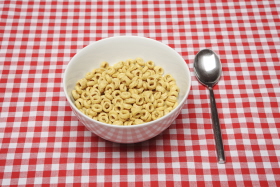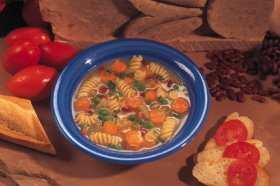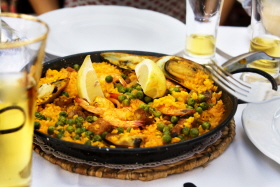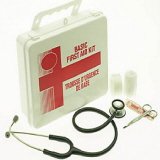|
Do You Want To Stay Healthy With Open,Mind-Mealtime-Stratergies
We've given you some basic information on fat, fiber, and sodium. We've provided some tips on decreasing fat,saturated fat, cholesterol and sodium; and increasing fiber But, how do you put it all together when it comes to breakfast,lunch, and dinner?
Open Mind Mealtime Stratergies-Breakfast 
Strategy #1--Choose fruit more often. Just a few great choices in the fruit family are: cantaloupe (melon), grapefruit, strawberries, oranges, bananas, pears, and apples. Strategy #2--Choose whole-grain cereals and products more often. Examples are whole wheat or bran breads, bagels, and cereal. Strategy #3--Try making pancakes and waffles with whole wheat flour instead of white flour and one whole egg and one egg white rather than two whole eggs. For a low-fat topping with fiber, try applesauce, apple butter and cinnamon, or fruit and low-fat plain yogurt. Strategy #4--Fruit juice and skim milk are familiar breakfast drinks. For an extra boost in the morning, why not try a fruit smoothie made from juice, fruit and nonfat plain yogurt blended together. Other nonfat choices are sparkling water, coffee, and tea. These breakfast choices are sound nutrition choices because they are not only low in fat and cholesterol but also provide fiber, vitamins, and minerals. Some foods that you should choose less often are sausage, bacon, butter, whole milk and cream (including commercial nondairy creamer). These foods are high in saturated fat and cholesterol.
Open Mind Mealtime Stratergies-Lunch

Strategy #1--Try a fiber-rich bean, split pea, vegetable, or minestrone soup. Use commercially canned and frozen soups and cream soups less often--they can be high in sodium and fat. If you make your own soup, use broth or skim milk to keep the fat content low. Strategy #2--Have a bean salad or mixed greens with plenty of vegetables. For fiber include some vegetables like--carrots, broccoli, cauliflower, and kidney or garbanzo beans. For a low-fat dressing, try lemon juice or a reduced-calorie dressing. If you use regular dressing, use only a very small amount. Strategy #3--Try sandwiches made with water-packed tuna, sliced chicken, turkey, lean meat, or low-fat cheese, and use whole-grain bread or pita bread. To decrease fat, use reduced-calorie mayonnaise, or just a small amount of regular mayonnaise, or use mustard. Mustard contains no fat. Strategy #4--For dessert, have fresh fruit, low-fat yogurt, or a frozen fruit bar. Strategy #5--Fruit juice and skim milk are good beverage choices. Club soda with a twist of lemon or lime, hot or iced tea with lemon, or coffee without cream are refreshing drinks.
Open Mind Mealtime Strategies recommends at lunch, try to eat these foods less often: processed luncheon meats, fried meat, chicken, or fish; creamy salads, french fries and chips, richer creamy desserts, high-fat baked goods, and high-fat cheeses such as Swiss, cheddar, American, and Brie. Open Mind Mealtime Stratergies-Dinner 
Strategy #1--Eat a variety of vegetables. To increase
variety, try some that might be new to you, such as those from
the cabbage family (broccoli, Brussels sprouts, cauliflower,
and cabbage), dark-green leafy vegetables (spinach and kale),
and yellow-orange vegetables (winter squash and sweet
potatoes). Strategy #2--Try whole wheat pasta and casseroles made with brown rice, bulgur, and other grains. If you are careful with preparation, these dishes can be excellent sources of fiber and low in fat. For example, when milk and eggs are ingredients in a recipe, try using 1 percent or skim milk, reduce the number of egg yolks and replace with egg whites. Here are some ideas for grain-based dishes: --Whole wheat spaghetti with fresh tomato sauce; --Whole wheat macaroni and chickpea stew in tomato sauce; --Tuna noodle casserole, using water-packed tuna (or rinsed, oil-packed tuna), skim milk, and fresh mushrooms or sliced water chestnuts; --Turkey, broccoli and brown rice casserole using skim milk and egg whites; --Eggplant lasagna, made with broiled eggplant and part-skim mozzarella or ricotta cheese. Strategy #3--Substitute whole-grain breads and rolls for white bread. Strategy #4--Choose main dishes that call for fish, chicken, turkey or lean meat. Don't forget to remove the skin and visible fat from poultry and trim the fat from meat. Some good low-fat choices are: --Red snapper stew; --Flounder or sole florentine (make the cream sauce with skim milk); --Salmon loaf (use skim milk, rolled oats, and egg whites); --Baked white fish with lemon and fennel; --Chicken cacciatore Italian-style (decrease the oil in the recipe); --Chicken curry served over steamed wild rice (choose a recipe that requires little or no fat; "saute" the onions in chicken broth instead of butter); --Light beef stroganoff with well-trimmed beef round steak and buttermilk served over noodles; --Oriental pork made with lean pork loin, green peppers and pineapple chunks served over rice.
Strategy #5--Choose desserts that give you fiber but little fat such as: --Baked apples or bananas, sprinkled with cinnamon; --Fresh fruit cup; --Brown bread or rice pudding made with skim milk; --Oatmeal cookies (made with margarine or vegetable oil; add raisins). For many, the end of the workday, represents a time to
relax, and dinner can be a light meal and an opportunity to
decrease fat and cholesterol.
Open Mind Mealtime Stratergies hopes this article may have given you some ideas.
Return to Open-Mind-Publishing
|





 Open Mind Mealtime Strategies
Open Mind Mealtime Strategies






